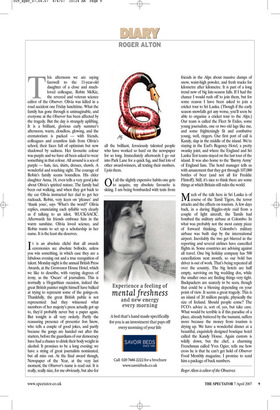T his afternoon we are saying farewell to the 11-year-old daughter
of a close and muchloved colleague, Robin McKie, the revered and veteran science editor of the Observer. Olivia was killed in a road accident one Friday lunchtime. What the family has gone through is unimaginable, and everyone at the Observer has been affected by the tragedy. But the day is strangely uplifting. It is a brilliant, glorious early summer’s afternoon, warm, cloudless, glowing, and the crematorium is packed — with friends, colleagues and countless kids from Olivia’s school, their faces full of optimism but now shadowed by sadness. Her favourite colour was purple and we have all been asked to wear something in that colour. All around is a sea of purple — hats, ties, shirts, dresses, shawls. A wonderful and touching sight. The courage of Robin’s family seems boundless. His elder daughter Anna, 18, even tells a very good joke about Olivia’s spirited nature. The family had been out walking, and when they got back to the car Olivia instructed her dad to get her rucksack. Robin, very keen on ‘pleases’ and ‘thank yous’, says ‘What’s the word?’ Olivia replies, enunciating each syllable very clearly as if talking to an idiot, ‘RUCK-SACK’. Afterwards his friends embrace him in the warm sunshine. Olivia loved science, and Robin wants to set up a scholarship in her name. It is the least she deserves.
It is an absolute cliché that all awards ceremonies are absolute bollocks, unless you win something, in which case they are a fabulous evening out and a true recognition of talent. Monday night is the annual British Press Awards, at the Grosvenor House Hotel, which we like to describe, with varying degrees of irony, as the ‘Oscars’ of journalism. This is normally a Hogarthian occasion, indeed the great British painter might himself have balked at trying to represent some of the goings-on. Thankfully, the great British public is not represented: had they witnessed what members of her majesty’s press actually got up to, they’d probably never buy a paper again. But tonight is all very orderly. Partly the reassuring presence of presenter Jon Snow, who tells a couple of good jokes, and partly because the gongs are handed out after the starters, before the guardians of our democracy have had a chance to drink their body weight in alcohol. It promises to be a long evening: we have a string of great journalists nominated, but all miss out. At the final award though, Newspaper of the Year, at the very last moment, the Observer’s name is read out. It is really, really nice, for me obviously, but also for all the brilliant, ferociously talented people who have worked so hard on the newspaper for so long. Immediately afterwards I go out into Park Lane for a quick fag, and find lots of other award-winners, all texting their mothers. I join them.
Of all the slightly expensive habits one gets to acquire, my absolute favourite is skiing. I am being bombarded with texts from friends in the Alps about massive dumps of snow, waist-high powder, and fresh tracks for kilometre after kilometre. It is part of a long trend now of big late-season falls. If I had the chance I would rush off to join them, but for some reason I have been asked to join a cricket tour to Sri Lanka. (Though if the early season snowfalls get any worse, you’ll soon be able to organise a cricket tour to the Alps.) Our team is called the Fleet St Exiles, some young journalists, one or two old lags like me, and some frighteningly fit and combative young, well, ringers. Our first port of call is Kandy, slap in the middle of the island. We’re staying in the Earl’s Regency Hotel, a pretty swanky joint, and where the England and Sri Lanka Test teams stayed on the last tour of the island. It was also home to the ‘Barmy Army’ of England fans. The hotel manager tells us with amazement that they got through 107,000 bottles of beer (and not all for Freddie Flintoff). Still, it’s nice to think there are some things at which Britain still rules the world.
Much of the talk here in Sri Lanka is of course of the Tamil Tigers, the terror attacks and the effects on tourism. A few days back, in a daring Biggles-style raid from a couple of light aircraft, the Tamils had bombed the military airbase at Colombo. In what was probably not the most canny piece of forward thinking, Colombo’s military airbase was built slap by the international airport. Inevitably the two get blurred in the reporting and several airlines have cancelled flights in. Some countries are advising against all travel. One big holiday company has 500 cancellations next month, so our bold bus driver is out of work. That’s being repeated all over the country. The big hotels are half empty, surviving on big wedding dos, while the smaller ones are finding things very tight. Backpackers are scarcely to be seen, though that could be a blessing depending on your point of view. It seems a great tragedy. This is an island of 20 million people, physically the size of Ireland. Should people come? The FCO’s advice is, sort of, yes, but take care. What would be terrible is if this paradise of a place, already battered by the tsunami, suffers more because the money from tourism is drying up. We have a wonderful dinner at a beautiful, exquisitely designed boutique hotel called the Kandy House. Again custom is wildly down, but the chef, a charming Frenchman called Yves Ogier, tells me how cross he is that he can’t get hold of Observer Food Monthly magazine. I promise to send him a package of back numbers.
Roger Alton is editor of the Observer.


































































 Previous page
Previous page